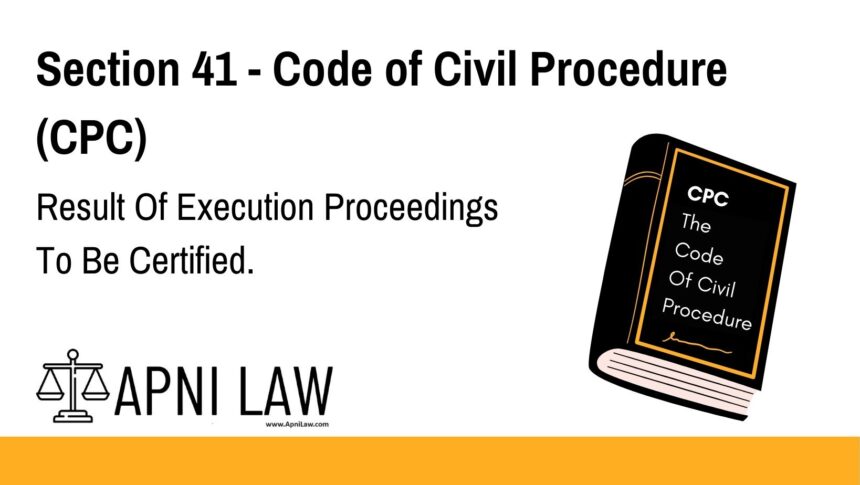Code
CPC(1) The Court to which a decree is sent for
execution shall certify to the Court which passed it the fact of such execution, or where the former Court
fails to execute the same the circumstances attending such failure.
Perfect 👍 This is Section 41 CPC – Certificate of Court Sending Decree. I’ll now draft the SEO-optimized article in ApniLaw format with proper structure, internal linking, examples, FAQs, and conclusion.
Section 41 CPC: Certificate of Court Sending Decree
Code
Section 41 – Code of Civil Procedure
(1) The Court to which a decree is sent for execution shall certify to the Court which passed it the fact of such execution, or where the former Court fails to execute the same, the circumstances attending such failure.
📖 Source: Section 41 CPC – Certificate of Court Sending Decree (ApniLaw)
Explanation
Section 41 CPC ensures communication between Courts during execution of decrees.
When a decree is transferred under Section 39 CPC or Section 40 CPC, the transferee Court (executing Court) must send a certificate back to the original Court (decree-passing Court).
This certificate contains either:
- Confirmation of execution (full or partial), OR
- Explanation of why execution failed.
Thus, Section 41 creates an accountability mechanism, ensuring the decree-passing Court is informed about the status of its decree.
Illustrations
- Example 1:
A decree passed in the Delhi Court is transferred to a Mumbai Court for execution. After successful attachment and sale of property, the Mumbai Court must send a certificate back to Delhi Court confirming execution. - Example 2:
A decree-holder transfers a decree from Patna Court to Kolkata Court. If the judgment debtor has no attachable property in Kolkata, the Kolkata Court must certify the circumstances of failure back to Patna Court. - Example 3:
A decree for delivery of land is transferred to another State Court, but the land is under dispute with third parties. The executing Court, being unable to deliver possession, must inform the original Court with reasons.
Common Questions and Answers
1. Why is a certificate required under Section 41 CPC?
It ensures that the decree-passing Court knows whether its decree has been executed or not, maintaining judicial accountability.
2. What happens if the transferee Court fails to execute the decree?
The transferee Court must record the circumstances of failure and certify them to the original Court.
3. Does the certificate close the execution process?
Yes, once the transferee Court certifies execution, the execution proceedings are considered complete.
4. Can the decree-holder apply again if execution fails?
Yes, the decree-holder can request another transfer if the judgment debtor has property elsewhere.
5. How does Section 41 connect with Section 42 CPC?
- Section 41 deals with certification of execution status.
- Section 42 CPC defines the powers of the transferee Court during execution.
Conclusion
Section 41 CPC establishes a reporting obligation for the executing Court. After attempting execution, the transferee Court must send a certificate to the original decree-passing Court confirming either execution or reasons for failure.
This provision ensures transparency and accountability in decree execution across jurisdictions, especially when read with Section 39 CPC and Section 40 CPC.
👉 For more details, visit: Section 41 CPC – Certificate of Court Sending Decree (ApniLaw).








